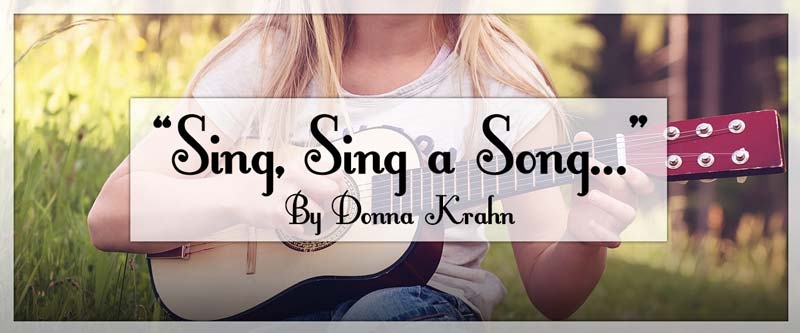Having trouble learning something? Time to bring in some music!
How many of you found yourself singing the rest of that song? The lyrics just come pouring back into your mind even after listening to it many years ago. A few days ago, I had a phone conversation with my adult daughter. It was a fun one that included some singing and reminiscing and laughing. She reminded me of all the music that took place in our home when she and her brother were young; she thought it was weird when I would twirl them around the kitchen while singing “Shall We Dance.” My daughter reminded me of how we would sing to them at bedtime – not just your typical lullabies, but farewell songs from Sound of Music and Lawrence Welk: “Good night, sleep tight and pleasant dreams to you, here’s a wish and prayer that all your dreams come true…”
My children are still music lovers and both play instruments. My son’s wife says that he will start singing a song from his childhood when something triggers a memory or begin playing them on his guitar. My daughter says that she is teaching some of the songs to her friend’s children. I didn’t realize what role music had played in their lives, but looking back realize that music was a daily occurrence – whether formal or informal.
Here in the Rainbow Resource office, we are often reminded of songs from our childhood. For example, Janice and Sara burst into “There’s a Hole in My Bucket” after someone said “well, fix it.” That turned into a whole conversation of, ‘where did I learn that song,’ the song origin, and childhood remembrances. Deanne will tell you that she can’t carry the tune in that bucket, but knows the song well. Although we (the consultants) don’t know all of the exact details or science, we know that music is part of our brain history.
I visited our warehouse to get their perspective on music, since music is streamed through the sound system during the work day. Those I spoke with told me that music is a motivator, helps them work better, and breaks the monotony of some tasks. Music prompts discussion and evokes memories. Jill M. (zone leader) has memories of her wedding when a certain song is played. Rummy (receiving manager) told me that she remembers her brother at the piano when “Imagine” is played and can sing a song about Columbus from her childhood. Mary (accounting) said that music just makes her happy.
A variety of emotions and feelings are evoked with different music genres, from sadness to excitement to anger. What about you? What songs always evoke specific memories?
How many times do you catch yourself humming a tune or singing along to music that isn’t there? I’ll bet that you remember commercial slogans that were put to music from when you were a child – “Oh, I wish I were an Oscar Meyer wiener…,” “Double your pleasure, double your fun, with Doublemint, Doublemint, Doublemint Gum;” and I bet we can all spell “B-O-L-O-G-N-A.”
It seems we effortlessly learn concepts paired with music. My children had a cassette tape that taught letter sounds, which came with a picture card that you could follow along with the song (“apple, apple, a, a, a…” Yes, I still know that song). We taught our children the names of the twelve disciples, books of the Bible, and the Fruit of the Spirit through songs. How about those Bible teachings and stories than can be learned and remembered through song – “Father Abraham had many sons…”, “The Lord said to Noah there’s gonna be a floody, floody…”, “The B-I-B-L-E,” and more. Jill M. recalled that she can always spell “Christian” by recalling “I am a C, I am a C-H, I am a C-H-R-I-S-T-I-A-N.”
Parents have a variety of music options at their fingertips that weren’t available 30 years ago. You have a plethora of CDs that you can check out at the library or purchase; YouTube offers a huge variety of music videos (you can be picky), and iTunes has music options in all genre.
Some of our favorite music products include Audio Memory and Twin Sisters CDs, both of which offer a wide variety of songs to teach math facts, letter sounds, states & capitals, geography, history, grammar, Bible songs, and Spanish. If classical music is more your style, there are CDs from Sing ‘n Learn that teach math facts to classical music. Sing 2 Learn opens the door to foreign language for your young ones. Sing, Spell, Read & Write uses music to teach phonics and Shurley English uses chants to teach parts of speech. I’ve only mentioned a few items that will enhance your curriculum, but music can really round out your child’s learning. (A little impromptu burst of singing is always fun too!)
We all agree that music is an important part of our lives and education (and let’s not forget that it’s fun too). It helps us remember and stimulates brain activity; affects our moods, feelings, and emotions; and provides bonding experiences. Music transports us back to our youth and to places we only see in our minds. It may cause us to break into dance or to kick back and relax. Many of you already use music in your daily routine, and can relate to much of what is written here. If you don’t use music, it might be something to think about. Thank you to everyone who shared their memories and experiences for this article, it was fun to stroll down memory lane with all of you – and sing a few tunes.
“Music speaks what cannot be expressed, soothes the mind and gives it rest, heals the heart and makes it whole, flows from heaven to the soul.”
– Anonymous





